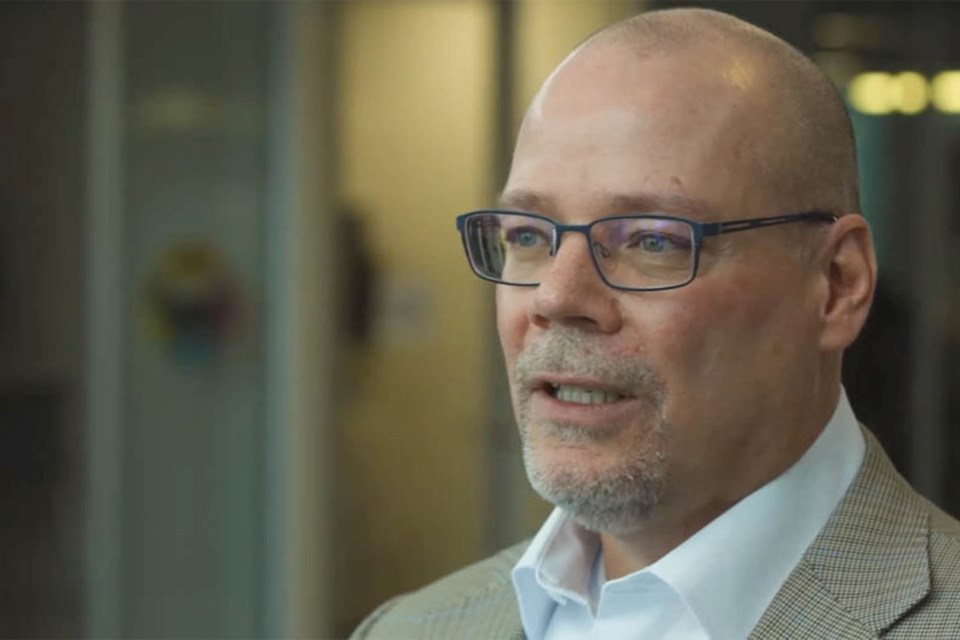OLDS — Once again, Olds College held one of its main fundraisers – A Celebration of Alberta Ag -- online via a live-streamed broadcast April 8 from the college.
The college did the same thing last year, due to COVID-19 restrictions.
During the approximately two-hour event, held in the McLellan Arena, college officials and students highlighted new facilities under construction; the advantages the college offers, including state-of-the-art, hands-on education for students; and innovations fostered by applied research.
Tribute was also paid to Highfield Investment Group Inc., announced earlier as the college’s Partner of the Year.
Country singer Aaron Goodvin and his band provided entertainment. Goodvin, formerly of northern Alberta, now lives and works in Nashville.
In an interview during the event, Olds College president Stuart Cullum said staging A Celebration of Alberta Ag is important, not only to highlight what the college does and the advantages it provides to the Alberta economy, but also to pay tribute to those who partner with and support the institution.
“We really provide the ecosystem where those groups can come together, work on problems and issues. And by doing that, we’re really able to advance the industry. We’re able to advance learning, we’re able to advance practice, advance technology,” he said.
Cullum and Patrick Machacek, the college’s vice-president of development and strategy, said Highfield Investment Group was named Partner of the Year because of its support for the college, especially its partnership regarding environmental stewardship and sustainability.
Machacek noted that for example, the company is collaborating with Olds College researchers regarding a series of ponds. The idea is to take runoff water and reconstitute it for industrial use.
“It’s an extremely exciting project because it is focusing on both conservation and environmental stewardship," Machacek said.
“Partnerships of course, also invest in the college and by doing so, they’re investing in our students and their futures as well,” Cullum said.
Highfield Investment Group president Adrian Munro said the company was started by his father in 1975.
“It’s important to us in a sense to give back and see if we can’t make a difference and support the generations that are upcoming,” Munro said in a video broadcast as part of the livestream.
“Water is an important component of our world and we really need to figure out how to protect it and protect it at its source.”
Tom Ranieri, the college’s director of campus development and facilities, took viewers on a tour of facilities being renovated and expanded to provide more space for student and faculty as well as incorporate state-of-the art technology.
The James Murray Building is being redeveloped into an Ag-Tech Learning Hub that will house the Werklund School of Agriculture Technology and the Lachlin McKinnon Building is being renovated to become the new Animal Health Education Centre.
Ranieri said the new farm shop under construction will serve as a Smart Farm operations centre, a welcoming space for students, faculty, staff and visitors.
There’ll be more light, more places for students to congregate, study and work together. Class spaces will be flexible; able to be expanded or made smaller, depending on the need.
Ranieri said big machinery will be able to be driven right in to learning spaces for students to get hands-on experience.
“We’re incredibly close with our industry and so we ensure that our programs are continuously refined to reflect where agriculture is today and where it needs to go tomorrow,” said Debbie Thompson, the college’s vice-president of academic and student experience.
Several members of the college’s research team highlighted various projects underway to streamline agriculture and make it more environmentally-sustainable.
One example cited was the incorporation of facial recognition technology to optimize calving and determine as early as possible when animals might be sick.
Another project focuses on the use of anti-microbials to target specific parasites in animals such as sheep.
“So instead of blanket-treating a whole flock and hoping that we catch the right bug with the right drug, we’re helping to target that so we can help reduce the amount of drugs needed to be effective,” said Lorna Baird, business development coordinator for the college’s Technology Access Centre for Livestock Production.
Other innovations being worked on include carbon sequestration and utilizing drone technology to survey hail damage, and using soil moisture sensors to predict yield potential.
Joy Agnew, the college’s associate vice-president of applied research, noted that Olds College has joined with two other institutions to form the Pan-Canadian Smart Farm Network. The idea is to share discoveries and expertise.
She said the network is expected to grow to at least six institutions in the future.



